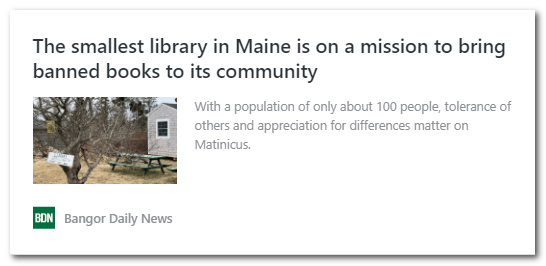Guest Post by True Contributor Mike Straw
Every Sunday morning it’s a highlight of my week as I get to digest interesting and unusual news stories down to 100–200 words, then give it a slug at the top and a creative tagline at the end.
These stories may make you laugh, cry, get angry, or experience a variety of other (or no) emotions — but they will always make you think.
This week one of the articles I covered was about the Matinicus Island Library, and how this tiny library in a tiny Maine community is bringing banned books to its residents — because they want to read them.

Books in their inventory include:
- Catch-22 by Joseph Heller
- To Kill a Mockingbird by Harper Lee
- The Handmaid’s Tale by Margaret Atwood
- The Grapes of Wrath by John Steinbeck
- The Bluest Eye by Toni Morrison, and
- And Tango Makes Three, published in 2005, tells the true story of two male penguins at Central Park Zoo in New York City who raised a chick together. It is one of the most banned books in the country, according to the American Library Association.

The article was inspiring. I’ve never understood the purpose of banning books. Even if you believe the contents of the book are horrible, hiding their contents from view is dangerous: if you don’t understand the positions you are against, how can you fully understand your own position? I also get very suspicious of people or groups who refuse to allow any criticism of their own beliefs or positions because if a statement is true, it will stand up to scrutiny.
I loved that this community is doing this amazing thing, all with the goal to give the islanders access to what they want to read. In the article, they were also very explicit about the kind of books the library wouldn’t accept.
They didn’t want their library to be overrun with musty, dog-eared, hand-me-down books that someone else just wanted to offload. They wanted books in good condition that islanders would want to read.

Enter “Big Media”
So, while researching the article, I happened to click on the link to the library, which took me to their Facebook page. I was surprised at the latest post there:
It has been brought to our attention that the recent Bangor Daily News piece about our library has been picked up by the Associated Press, which resulted in a story in U.S. News and other news outlets slanting us as the “Island of Misfit Toys” and suggesting that we wanted other libraries’ cast-offs. PLEASE—we’re BEGGING you—do NOT ship us your cast-aways! We have very little space and are NOT trying to “bulk up” our collection!
I checked the U.S. News article, and sure enough, there it was right in the subtitle and lede:

“There’s an ‘Island of Misfit Toys’ in the popular holiday classic. Now there’s an island for unwanted and banned books, too.”
The rest of the article, which is directly from Associated Press, does seem to accurately describe what the library is actually doing, but people usually don’t read that far, and anyone just looking at the preview on a social media feed or scanning the top of the article will just see what AP put at the top. And USN made it worse with their subtitle.
Think About What You Read
This is why it’s important to think about whatever you’re reading and check multiple sources, especially original sources if possible. One thing that I’ve loved about working with True is that Randy Cassingham enforces working from the original sources whenever we can, which often leads to finding out the original information instead of what’s presented in the global “telephone game” where media and bloggers copy copies of copies into their own articles.
Every article on the Internet (including this one) has a slant, theme, and intent, which is why it’s important to read varying points of view and expand your knowledge by reading as much as you possibly can.
Which is kind of why that little library is doing what it’s doing.
—
Publisher’s Note: Adapted from the original on Mike’s blog, ©2022 Mike Straw, Reprinted with Permission.
Publisher’s Comments
Every article on the Internet (including this one) has a slant, theme, and intent, which is why it’s important to read varying points of view and expand your knowledge by reading as much as you possibly can.
Boy, isn’t that key. Escape the echo chamber!

I want to editorialize a little bit about the supposedly professional reportage by the Associated Press: their sloppiness has significantly harmed a small volunteer organization. It has created a significant waste issue on a tiny island. It is causing significant work for volunteers.
What do they intend to do about all of that? I’m calling you out, AP: pay up whatever it takes to make them whole. Readers need to Think About What You Read. You need to Think About What You Do.
—Randy Cassingham
Related Post: Banned Books Week
More on Banned Books at BannedBooksWeek.org.
– – –
Bad link? Broken image? Other problem on this page? Use the Help button lower right, and thanks.
This page is an example of my style of “Thought-Provoking Entertainment”. This is True is an email newsletter that uses “weird news” as a vehicle to explore the human condition in an entertaining way. If that sounds good, click here to open a subscribe form.
To really support This is True, you’re invited to sign up for a subscription to the much-expanded “Premium” edition:
Q: Why would I want to pay more than the minimum rate?
A: To support the publication to help it thrive and stay online: this kind of support means less future need for price increases (and smaller increases when they do happen), which enables more people to upgrade. This option was requested by existing Premium subscribers.

This is what happens when clicks or “eyes” are more important than facts or integrity. Since the story itself was correct, I’m inclined to blame the editor. Either way, there is no excuse.
—
Though many news sites have eliminated (or at least reduced) the editor staff to save money. -rc
… and by reducing their editorial quality have in turn lost my patronage. When a certain well known paper flubbed basic mathematics and got prime, composite, and odd numbers scrambled, it was the last straw. The occasional typo is one thing (something that I’d never seen in 30+ years of reading daily big city papers, but which I started seeing once in a while in the last decade), but grade school math is another.
Interestingly, my recycling bin fills up a lot more slowly now.
—
I use “Google Discover” to pitch me stories that I might otherwise not see, and what it pitched me today made me click “Don’t show stories from Newsweek”. I subscribed to Newsweek when I was about 17. Why did I stop about 30 years later? Because despite that track record, they didn’t even bother to send me a renewal notice. Don’t want my business? Fine! Very shortly after, the Washington Post sold it off, and if I thought it had gone downhill at that point, we hadn’t seen anything yet.
Lately, I see that their stock in trade is not news, but rather “The Internet reacts to…” some post. That’s right: they write about viral Reddit threads and such. Clue: that’s … not … news. With all that’s going on in the world, that’s where they put their efforts?
But what really puts the nail in the coffin is that they actually try to cover news, they can’t even write THAT well! Seriously: the IfG is an “independent tank tank”?! I prefer think tanks, tank you very much. But it sure is heartwarming to read about “the Russia’s struggles in Ukraine”. Well, this is about all I read of the “article” before I backed out and told Google to never show me Newsweek articles again. They should bury their heads in shame as Thomas J.C. Martyn spins in his grave. -rc
Just a few days ago on “Jeopardy” I became aware of the word “lede” as an actual and correctly-spelled word. Now the circle is complete.
—
Heh! Yeah, old journalism term. We don’t use “lead” because “leading” (pronounced “ledding” because it refers to the metal lead) is the space between lines of type, which was created by strips of the metal between the lines of lead type. -rc
It saddens me that the USA, a country which talks about freedom so much, doesn’t give its citizens, in some states at least, the freedom to read any book they wish to read. But I suppose freedom also includes the freedom to ban books considered to be offensive: that doesn’t make book-banning right, though. I wonder how many of those leaders who have banned books have actually read the books they don’t want others to read! Possibly not many.
—
No, freedom is about being able to choose what one does for themselves. Demanding to dictate what other people can choose isn’t freedom, it’s tyranny. -rc
If I saw saw an article about an island “on a mission”, I would think it referred to what they were taking the *intitative* to *procure*, or a broader metaphor.
If people are *shipping* them things, that strikes me as careless (lazy/obliviot) readers, not lazy reporting.
—
Perhaps. But to invite such from readers is still poor quality and unprofessional reporting, and the reason they had to ask for it to stop is because (yep!) people were doing it. -rc
Thanks a lot, Associated Press. (Not!) Ugh.
I’ve long said journalists make s#!t up — based on experience, mind, of reading articles whose primary source was a writer’s imagination — and this is just another example of someone taking one thought and extrapolating it w-a-a-a-a-y beyond the truth.
I wonder if this kind of nonsense is covered in journalism school, or if it’s something they carefully skirt in order to let their graduates go off and do whatever the heck they like.
—
The latter (though I suppose it depends on the school: I have no experience with other countries in that realm). Then, it depends on the publication. Some thrive on making stuff up — it’s part of their style. American tabloids are famous in that regard. “Real” news organizations don’t stand for it: Jayson Blair, Janet Cooke, and Jack Kelley are examples. The common thread: their publications came forward to tell the public what they discovered, and the journalists were fired (or resigned). -rc